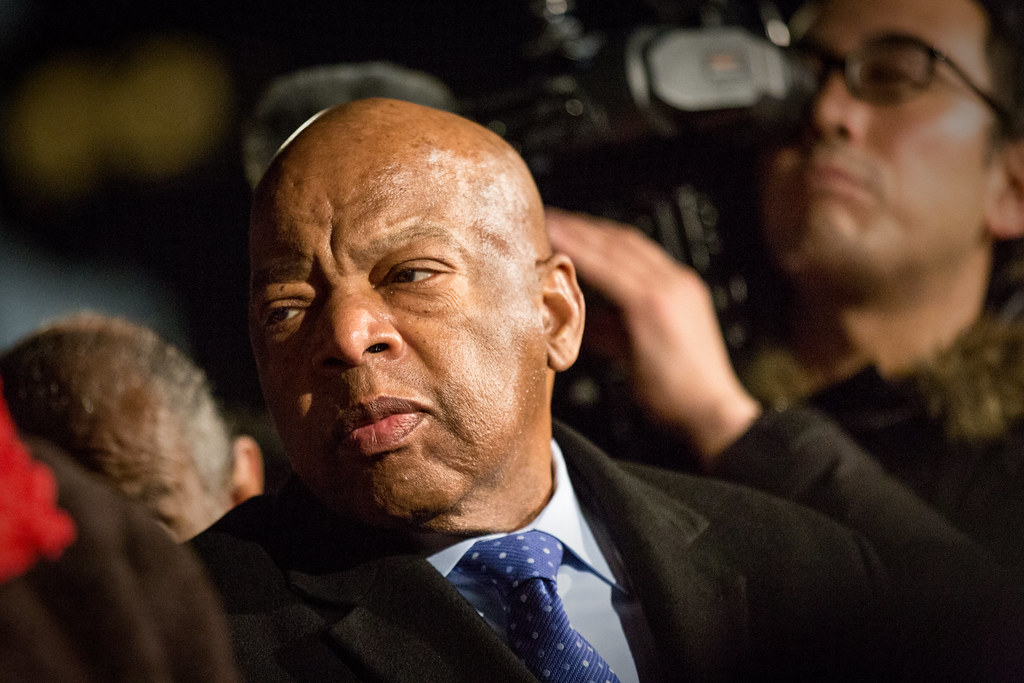
- Details
- By Levi Rickert
ATLANTA—Indian Country is mourning the death of U.S. Representative John Lewis, one of the giants of the Civil Rights Movement. Lewis passed away on Friday night from pancreatic cancer. He was 80 years old.
After making a name in the Civil Rights Movement as a teen, he was elected to the U.S. House of Representatives for 17 terms to represent a congressional district in Atlanta, Ga.
Lewis often said the work he did to bring about voting rights and equal treatment of all Americans was done through “good trouble.” That good trouble involved being bloodied and literally knocked unconscious as he led civil rights protesters across the Edmund Pettus Bridge in Selma, Alabama and being arrested 40 times from protesting social injustice.
An aide to the Rev. Dr. Martin Luther King, Jr. and Sen. Robert F. Kennedy’s presidential campaign, Lewis went on to become a strong voice for himself and was first elected to Congress in 1986.
He was known as the conscience of Congress. On Saturday, former President Bill Clinton called Lewis the “conscience of the nation.”
Lewis was a friend and strong ally to American Indians. Suzan Shown Harjo (Cheyenne and Muscogee), a former executive director of the National Congress of American Indians (NCAI) said she could always count on Lewis’ support in Congress for American Indian policy issues and concerns.
“I never had to convince him to sign on a letter, sponsor legislation, lend his name, make remarks—he always said yes before I completed the request. If asked, but only if asked, he would share his ideas for reaching the righteous goal, for gaining others’ support, for conducting the campaign, for working with energy, strength and in honorable ways,” Harjo said.
“He supported Native rights and never questioned our priorities—from children, health, education and jobs programs and social, racial, gender justice issues to protecting sacred places, religious freedom and ancestors, to museum and institution building, to dropping Custer and designating the Little Bighorn National Battlefield Monument and to getting rid of the vile name of the Washington R*dsk*ns,” Harjo continued.
On Saturday, the current NCAI chief executive officer Kevin Allis (Potawatomi) offered a comment to Native News Online.
“Our country mourns the loss of a titan, a man who possessed an unwavering passion, and the courage to fight for equality. Friday night he joined Dr. King, and they together will continue to look down upon us, giving us the grace to fight for social justice,” Allis said.
Four years ago, at the 2016 Democratic National Convention in Philadelphia, Pa., Lewis electrified the Native American Caucus when he said, “Teach our children – all of our children – the way of peace, the way of love and the way of non-violence. Be hopeful, be optimistic and be happy, and never EVER give up or lose your sense of hope or optimism.”
Yvette Joseph (Colville Confederated Tribes), who has attended five Democratic party conventions and this year is a Biden national delegate representing the Washington State 5th congressional district, fondly remembered Lewis' visit to the Native Caucus in 2016.
‘This message was nearly identical with one shared by a sacred heavenly being on the North Half of our Colville Indian Reservation in the late 1880s. While John Lewis is a legendary civil rights icon and one of the greatest politicians of all time, I think he was a deeply spiritual man with divine gifts. Our commonality was in raising chickens as children,” Joseph commented.
More Stories Like This
Native News Weekly (August 25, 2024): D.C. BriefsUS Presidents in Their Own Words Concerning American Indians
Ethics Complaint Alleges Former Navajo Nation Chief of Staff Accepted Gifts From Contractor
Monday Morning (December 14, 2025): Articles You May Have Missed This Past Weekend
Native News Weekly (December 14, 2025): D.C. Briefs
Help us defend tribal sovereignty.
At Native News Online, our mission is rooted in telling the stories that strengthen sovereignty and uplift Indigenous voices — not just at year’s end, but every single day.
Because of your generosity last year, we were able to keep our reporters on the ground in tribal communities, at national gatherings and in the halls of Congress — covering the issues that matter most to Indian Country: sovereignty, culture, education, health and economic opportunity.
That support sustained us through a tough year in 2025. Now, as we look to the year ahead, we need your help right now to ensure warrior journalism remains strong — reporting that defends tribal sovereignty, amplifies Native truth, and holds power accountable.
 The stakes couldn't be higher. Your support keeps Native voices heard, Native stories told and Native sovereignty defended.
The stakes couldn't be higher. Your support keeps Native voices heard, Native stories told and Native sovereignty defended.
Stand with Warrior Journalism today.
Levi Rickert (Potawatomi), Editor & Publisher

